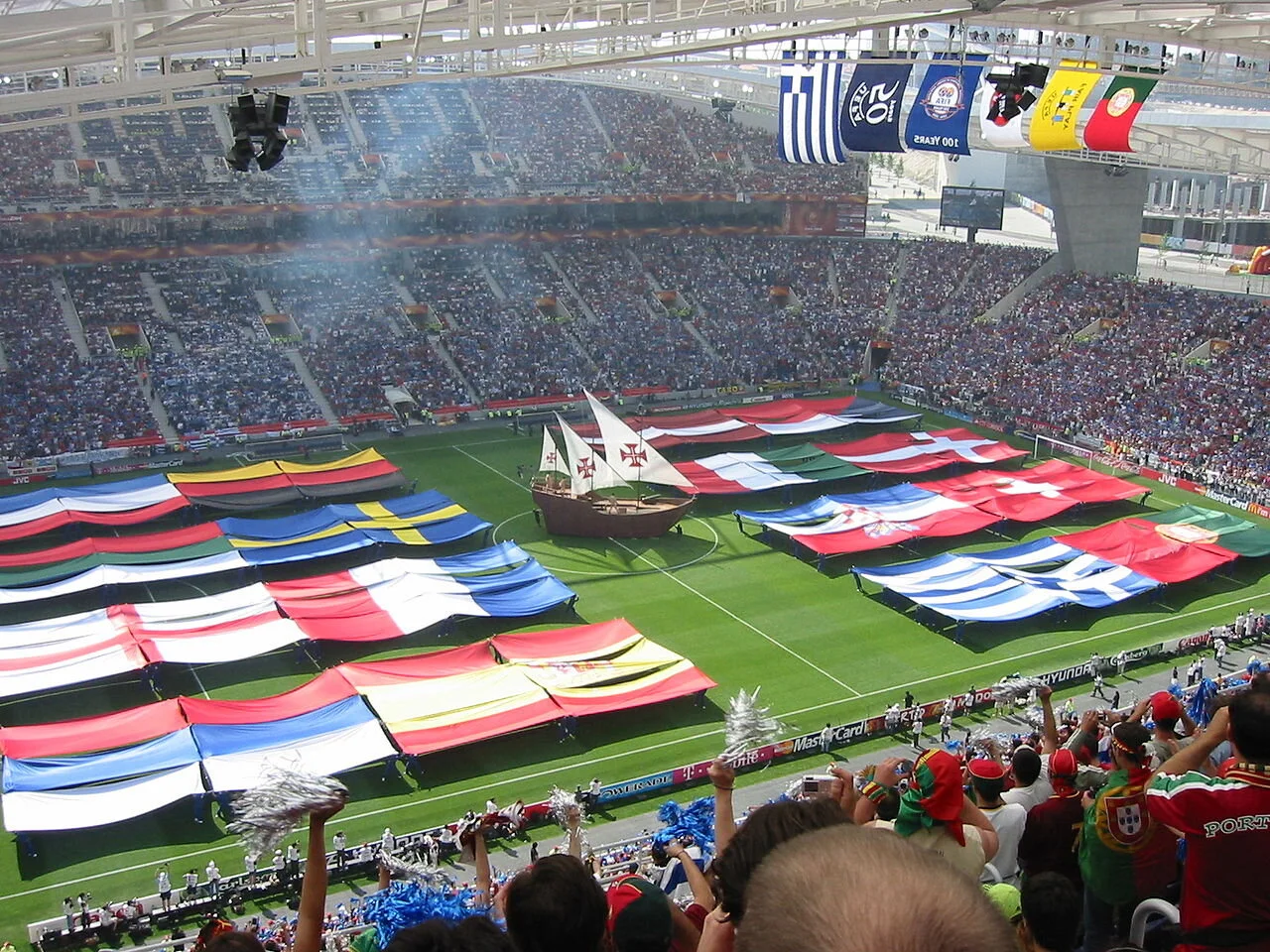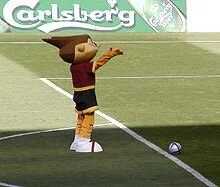The nearly perfect team. Czech Republic at Euro 2004
Television commentators are, or are at least supposed to be, our intermediaries to the game; the best ones can demystify confusion, lighten a dull game, enhance a good one. They inform and entertain, and even if there likely isn’t a person alive who watches a match because of a commentator, a televised game without commentary is a pretty tedious affair.
It’s an incredibly difficult job, and, to lean on a bit of specious, empty, axiomatic thinking, you only appreciate the good ones when you hear the bad ones (I’m thinking of you, Sky commentator who could hardly contain himself in announcing that the Premier League is in the middle of a “penalty pandemic!”. 50,000 dead – take a look at yourself).
Every now and then, however, even the very best will reach for what seems to be a reflexive, compulsively-turned phrase or factoid. One of the (few) welcome by-products of Liverpool’s recent success is that “That night in Istanbul” is now much lesser-seen. “If anything, he’s hit that too well” rightly still draws mass cringing; any talk of being “disappointed”, when it doesn’t pass you by like the white noise proposition it actually is, registers only for its utter inanity. If it’s a leathery old pro making their co-commentary entrance, maybe we’ll offer some leeway for wheeling out these tired old tropes, but for the 800-game veterans, the ones who repose in such comfort in their jobs that they’ll gladly discuss the atmosphere in the hotel that they were “actually” sharing with the away team in some far-flung European outpost, slipping into this sort of guff is a vice best avoided.
2006 birthed maybe the two most odious such gobbets of received wisdom: the runner up in the tedious byline stakes came after the World Cup final – the portends to it were always signalled well in advance by the commentator inflating rapidly almost hear the shoulders bouncing in delight, the cheeks turning ruddy, as we’re told – hahaha – that Simone Perotta was actually – haha – BORN in Ashton Under-Lyne, hahaha, so an Englishman DID win the World Cup in 2006 after all! Yup, we could claim that stolid water-carrying picture of midfield dependability and his World Cup winner’s medal for his own! (incidentally, how perfect is it that the foreign World Cup winner we would jokingly take as our own was a bustling, shuttling sort of player? Whenever the Perotta trump card were slammed I would wonder—had Andrea Pirlo or Francesco Totti by some mischance been born in Streatham or Uttoxeter, would we have the gall to even in jest stake a lien on players touched by such an un-English sublimity?).
The worst of all, though, was that, prior to and during the tournament, it was now voguish to reference – at every possible juncture – that any team could win the whole thing; anyone, we were told with great assurance and solemnity, could “Do a Greece”.
It is worth saying that we must not elide the notion of Doing a Greece with that of Doing a Leicester or any other underdog story to slip into the vernacular. The reasons for this are legion: Leicester counterattacked with brio and lustre; Greece defended their own area like their claim to the Elgin Marbles. Where Mahrez and Vardy sparkled, Kante and Drinkwater were buzzsaws and Morgan, Huth and Schmeichel were totems, most of Greece’s squad, having saturated the tournament with their sludgy anti-football, were snatched up by big European clubs, underperformed, and promptly vanished into obscurity.
Greece’s own ‘style’ wasn’t the worst of the crimes they committed against the game that summer, however. In reaching the final, they eliminated one of the most criminally forgotten, dazzlingly exciting international sides in recent memory.
The Czech Republic squad of 2004 was not replete with big names. Pavel Nedved stood out – his trademark blonde mop tracking a path up and down the left wing – though the lesser lights of Tomas Rosicky (then an emerging talent at Dortmund before the dual mires of injury and Arsenal sapped away at him), hulking 7ft striker Jan Koller, Petr Cech (disconcertingly fresh-faced and un-behelmeted, when watching back, who hadn’t yet played for Chelsea and established himself as one of the continent’s premier goalkeepers) and Manchester United outcast Karel Poborsky were well enough known. Their strength instead came from their system which, looking back, feels like the last outing of a true diamond 4-4-2. Marauding left-back Marek Jankulovski overlapped into the space left by Nedved, while Poborsky hugged the touchline on the other side. Rosicky was given licence to sit behind Jan Koller and Milan Baros, with the disciplined Thomas Galasek doing the grunt work behind. Tomas Ujfalusi – all elbows and shins and bristle, and lank, chip fat hair – and alternately Rene Bolf and Martin Jiranek were formidably robust behind him.
The Czechs were the sly ‘dark horse’ pick of a few pundits ahead of Euro 2004, with many scared off by a brutal Group D draw that placed them alongside traditional powerhouses Netherlands and Germany. Some in the cognoscenti said that the two fearsome rivals would be “too wrapped up in facing each other” and similar (a coded nod to the chances of the two fearsome rivals—in particular the agricultural talents of Johnny Heitinga, Christian Worns, Jens Nowotny and Wilfred Bouma—kicking the ever-loving shit out of one another) and might “underestimate” the Czechs. But they needed no such helping hands – the Germany-Netherlands opening game was, in truth, a disappointment, with Germany largely keeping the Dutch at arm’s length before a late van Nistelrooy equaliser, two bookings apiece, and a sense that both sides quite fancied doing it again, for keeps, in a couple of weeks’ time.
Meanwhile, an unremarkable 2-1 win over Latvia did little to suggest the Czechs would upturn the established order in any meaningful way. The next game, against the Dutch, would be the true crucible. Recent years have maybe inured us to the idea of Dutch sides as paper-thin; the three or four megastars augmented by anonymous Eredivise journeymen. The 2004 vintage was to the contrary. Stam, Seedorf, Cocu, van Nistelrooy, Robben, Sneijder, Davids – if Barcelona had waited a few years in their “let’s just buy the Netherlands team” project in 2001, it might actually have paid off. This team could afford to leave Roy Makaay on the bench, fresh from scoring 32 goals in the 34-game Bundesliga season.
The Dark Horses pulled up lame at first – wilting in the face of so much star power, the Czechs conceded a Bouma header from a Robben freekick after four minutes, before Robben then squared for van Nistelrooy to tap in a second.
Up stepped Milan Baros, of all people. Baros almost embodies the phrase “flatter to deceive” at Liverpool – pacey, a good finisher, but selfish to the point of punchline level; when he received the ball, his head would drop, passing was out of the question, and he would run headlong for goal like a year 5 child having a rush of blood during a kickabout. Picking up a loose van Bronckhorst pass from 35 yards out, but marshalled by the granite-hewn Stam, the situation seemed unpromising. Stam, however, seemed baffled by the sheer persistence of Baros’ clumsy dribbling and poor decision-making. Stumbling and thrashing into the area, Baros somehow twisted both Stam and himself into a pretzel, lost and regained control of the ball, and, in reclaiming it, spotted the gargantuan figure of Jan Koller free from 6 yards. A simple square ball and a tap-in later, and the Czechs’ magical Euro run really began.
The rest of the game passed like a meeting of storms – the two sides smashing into each other relentlessly. Van Nistelrooy simultaneously dived and swung an air shot, a decent penalty shout cancelled out as much by the extravagant comedy of the moment; Sneijder thundered a shot at goal, only to see it batted away by a fresh-faced Petr Cech; Koller, of all people, flicked an impish backheel just wide; Robben drove a low shot onto the post; Nedved caught a dropping ball with a swivelling left-footed volley that van der Sar clung to with relief. The game hit twin peaks of quality and intensity.
The equaliser, when it came, was the perfect example of the Czechs’ balance of form, function and quality. Nedved cut inside, clipped an inswinging cross into Koller’s orbit. A chest down that, had it been a header, would have been “thumping”, was greeted by a meaty Baros half-volley into the top corner.
The Dutch deflated. Heitinga, who had played within himself against the Germans, was sent off – the rare recipient of the double yellow for persistent fouling, seemingly all of them on the quicksilver Nedved. By the time Poborsky seized on a spilled shot and squared for Smicer to tap in, the Czechs had been dominant for a spell. Other than that opening blitz, they had been more than a match for the more illustrious side.
Even resting key players in the final group game, the Czechs despatched Germany – themselves in a must-win position having blustered to a 0-0 draw with Greece-lite Latvia – 2-1; one Ballack howitzer aside, they had dominated against a disjointed side unsure of how best to squeeze
The Quarter-Final, against Denmark, was supposed to be a tense, tight game. The sort of tournament match that makes up the numbers, maybe goes to extra time or is settled by a set piece. We’ve all seen “that” game, in various guises, innumerable times. The dreadful Switzerland v Poland tie in 2016 stands out as the platonic ideal of the genre. Instead, the Czechs were once again electric – Baros and Koller tormented the Danes, Baros scored a pair wonderful goals, Koller nodded in a header off a corner, and Denmark were blasted out of the tournament. The Czech bandwagon gained momentum from all the hangers-on diving to join it. All that stood between them was that smothering blanket of a Greece team. They were on course for the sort of “fairytale” run that looked impossible at the outset.
But football has no respect for narrative, no matter that we – and our commentator guides - tell ourselves otherwise. We all know what happened next. Greece strangled the life out of the game, and anyone watching it, and repeated their trick in the final. The incentive to Do a Greece encouraged stodgy, stubborn dross from any international side without a surfeit of talent, and we quite possibly missed out on a decade of sides trying to do a Czech Republic – maximising their abilities, taking on bigger names, and playing electric football in a well-tailored system. And of course, it’s the worst game to lose, because no one remembers losing semi-finalists… Damn, maybe there’s something to these clichés after all?
And finally, nearly the perfect team with nearly the perfect run had nearly the perfect moment: in that feverish Netherlands game, Nedved hit the kind of shot that almost obliges phrases like “unleashed” and “uncorked”, or the oddly commonplace comparison to an Exocet missile (finding out that Exocet is French for “Flying Fish” rather neutered the idiom for me). Maybe we should have known then that just because something should happen, that really doesn’t mean it will.
Kielan Thompson, The Left-sided Problem
-
On this day in 2001, Zinedine Zidane signed for Real Madrid. This transfer is just one reason why the 2001/02 seaso… https://t.co/bI2J6AT97K
-
Little quiz question…who were the last team (and when) to reach a European Cup/Champions League final and not play… https://t.co/4bZlA9KYHH
-
16 years since this game. Not sure there has been a tournament match like it since, two top class teams, playing at… https://t.co/gbpaqAQ8Qj


